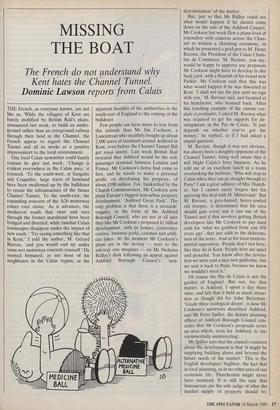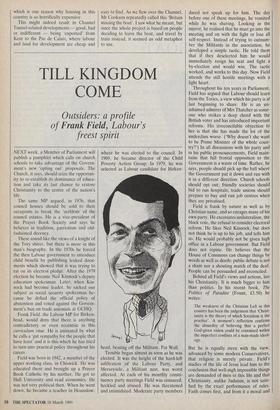MISSING THE BOAT
The French do not understand why Kent hates the Channel Tunnel.
Dominic Lawson reports from Calais
THE French, as everyone knows, are not like us. While the villagers of Kent are barely mollified by British Rail's plans, announced last week, to build an under- ground rather than an overground railway through their land to the Channel, the French appear to regard the Channel Tunnel and all its works as a positive improvement to the local environment.
One local Calais newsletter could barely contain its glee last week. 'Change is evident everywhere in the Calais area,' it rejoiced. `To the south-west, at Sangatte and Coquelles, large tracts of farmland have been swallowed up by the bulldozer to create the infrastructure of the future Channel Tunnel. To the south-east, the expanding concrete of the A26 motorway comes ever closer. As it advances, the mediaeval roads that twist and turn through the former marshland have been bridged and diverted, while familiar Calais townscapes disappear under the impact of new roads.' Try saying something like that in Kent,' I told the author, M. Gerard Barron, 'and you would end up under some wet motorway concrete yourself.' He seemed bemused, as are most of his neighbours in the Calais region, at the
apparent hostility of the authorities in the south-east of England to the coming of the bulldozer.
Few people can have more to lose from this attitude than Mr Jim Cookson, a Lancastrian who stealthily bought up about 2,000 acres of farmland around Ashford in Kent, even before the Channel Tunnel Bill got royal assent. Last week British Rail revealed that Ashford would be the sole passenger terminal between London and France. Mr Cookson's horse had come in first, and he stands to make a personal profit, on developing his property, of about £100 million. For, bankrolled by the Church Commissioners, Mr Cookson now plans Europe's biggest non-urban property development: 'Ashford Great Park'. The only problem is that there is a stewards' enquiry, in the form of the Ashford Borough Council, who are not at all sure they like Mr Cookson's proposed £1 billion development, with its homes, conference centres, business parks, cinemas and artifi- cial lakes. At the moment Mr Cookson's plans are in the in-tray — next to the ash-tray one imagines — on Mr Nicholas Ridley's desk following an appeal against Ashford Borough Council's 'non- determination' of the matter.
But, just so that Mr Ridley could see what would happen if he should come down on the side of the Ashford Council, Mr Cookson last week flew a plane-load of journalists with cameras across the Chan- nel to witness a charming ceremony, in which he presented a gold pen to M. Henri Ravisse, the President of the Calais Cham- bre de Commerce. M. Ravisse, you see, would be happy to approve any proposals Mr Cookson might have to develop in this back yard, with a flourish of his brand new Parker. Mr Cookson said that this was what would happen if he was thwarted in Kent. 'I shall not use the pen until we sign with you,' M. Ravisse said, and beamed at his benefactor, who beamed back. After this touching example of the entente cor- diale et profitable, I asked M. Ravisse what was required to get his support for de- velopments in the Pas de Calais. 'It just depends on whether you've got the money,' he replied, as if I had asked a stupid question.
M. Ravisse, though it was not obvious, has always been a doughty opponent of the Channel Tunnel, being well aware that it will blight Calais's ferry business. As he told me at an excellent lunch- in a room overlooking the harbour, 'Who will stop in Calais when they can go straight through to Paris? I am a great admirer of Mrs Thatch- er, but I cannot easily forgive her for agreeing this deal with M. Mitterrand.' But M. Ravisse, a grey-haired, heavy-jowled old trooper, is determined that his area should gain every sou it can out of the Tunnel and if that involves getting British developers like Mr Cookson to pay hard cash for 'what we grabbed from you 450 years ago', that just adds to the delicious- ness of the irony. And as for local environ- mental opposition: 'People don't riot here, like they do in Kent. People here are quiet and peaceful. You know after the revolu- tion we were sent a nice new guillotine, but we sent it back to Paris, because we knew we wouldn't need it.'
Of course the Pas de Calais is not the garden of England. But nor, for that matter, is Ashford. I spent a day there once, and felt that it held as much attrac- tion as Slough did for John Betjeman. 'Grade three ecological desert', is how Mr Cookson's surveyors described Ashford, and Mr Peter Spiller, the deputy planning officer of Ashford Borough Council con- cedes that Mr Cookson's proposals cover an area which, even for Ashford, is 'en- vironmentally uninteresting'.
Mr Spiller says that the council's concern about the development is that 'it might be supplying building above and beyond the future needs of the market.' This is the English developers' bugbear, the fact that in local planning, as in no other area of our economic life, Thatcherism might never have occurred. It is still the case that bureaucrats are the sole judge of what the market supply of property should be,
which is one reason why housing in this country is so horrifically expensive.
This might indeed result in Channel Tunnel-related developments — good, bad or indifferent — being 'exported' from Kent to the Pas de Calais, where labour and land for development are cheap and easy to find. As we flew over the Channel, Mr Cookson repeatedly called this 'Britain missing the boat'. I saw what he meant, but since the whole project is based on people deciding to leave the boat, and travel by train instead, it seemed an odd metaphor to use.



























































 Previous page
Previous page